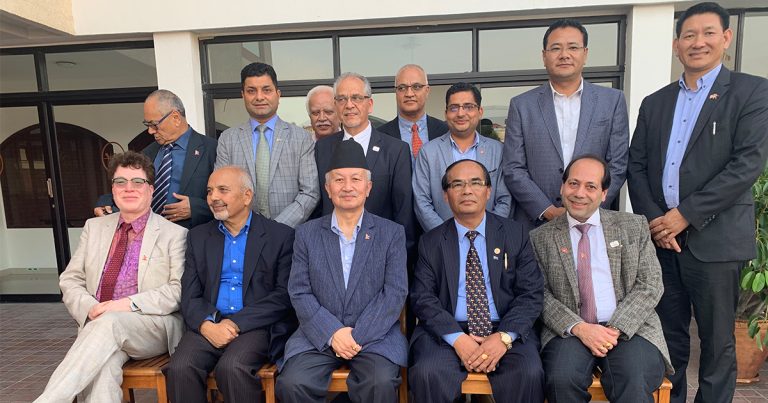
Non-Resident Nepali Association (NRNA)’s commitment towards the currently registered Citizenship Bill in the federal parliament and the provision of Non-Residential Nepali citizenship is unrelenting. The association is organizing several formal and informal meets to enable the smooth transition of the bill, bearing in mind the needs of millions of NRNs scattered globally.
On the same note, on June 26 and 27, when various Honorary Consulate Generals representing Nepal across the globe met in Nepal upon the request of Ministry of Foreign Affairs (MoFA) to discuss promoting Visit Nepal 2020 in their respective countries, an informal meeting to discuss the provision of Non-Resident citizenship to NRNs was held. The meeting was graced with the presence of senior politician Subhash Chandra Nembang, currently Member of Parliament (Ilam-2) and previous Chairman of the Constituent Assembly along with Nepali Congress’ Radheshyam Adhikari, Member of National Assembly. In the meeting, the attending Honorary Consulate General’s discussed the progress of the Citizenship Bill alongside put forth the plight of millions of NRNs suffering because of the delay.
The leaders assured concerned members saying ‘the constitution of Nepal ensures an NRN’s economic, social, and cultural rights; therefore there can be no dispute upon that’. According to them, despite the delay, the citizenship bill will not undermine the constitutionally guaranteed rights of NRNs. They have urged all citizens to not believe rumours about an NRN’s rights being curtailed – which are prevalent in social media. The meeting was attended by NRN Nepali Citizenship Continuation Coordinator Ram Thapa, Honorary Consulate Generals, Seattle and Washington’s Ac Sherpa, California’s Rishi P Dhakal, Melbourne’s Chandra Yonzon, Sydney’s Deepak Khadka, Adelaide’s Deepak Dhamala, Bucharest, Romania’s Nawaraj Pokhrel, Slovenia’s Ashwin Kumar Shrestha and Secretarial Chief Hemanta Dabadi.
Similarly, NRNA members have also been continuously committed towards the swift passage of the Citizenship Bill – NRNA has said they are satisfied with the provisions in the constitution. According to the constitution, an NRN can enjoy economic, social, and cultural rights, but not political rights. Once the Citizenship Bill is passed, an NRN can apply for an NRN citizenship.
Ram Pratap Thapa, Honorary Consulate General to Germany at Cologne and Chairman of German-Nepalese society has enlisted the following points:
- To avail a NRN Nepali Citizenship, the bill has to become an act – the act is not being stalled because of the NRN Citizenship provision, but for some other reason which has to be solved by a higher authority.
- There is no truth behind the rumour which states that ‘one can only not buy property until an NRN citizenship is issued’. The question which remains is ‘what action is to be taken if an NRN citizen is seen using his/her regular citizenship’ – in this too, a certain time provision for transition has tried to be incorporated.
- The procedure to avail an NRN citizenship has been tried to make as smooth as possible to encourage NRNs to move back to Nepal.
- The government is keen to follow the constitution, and guarantee similar economic, cultural and social rights to an NRN citizen (as observed till date). However, the body will not rest with the passing of the bill, instead try to continuously advocate for the rights of NRNs worldwide.
- As per the current rule, any Nepali citizen who takes up the citizenship of another nation (other than Nepal), the citizenship status of the concerned citizen is automatically cancelled. Until the bill is passed, the citizen will be treated as a ‘foreign national’.
- Using an invalid Nepali citizenship for any purpose shall is ‘illegal’ and likely to be met with a punishment. (Details of the likely punishment is unclear as of yet).
- As per the invalid Muluki Ain (The National Code), if a foreign national owns or comes to own an immovable asset in Nepal, the concerned person shall immediately either sell it or hand it over to a Nepali citizen.
- Provision to transfer a property to a Nepali citizen within 3 years of learning about property unknown to self – if not transferred within 3 years, the property could be transferred to the government. If it is family inherited, there is no time limit – however, the property cannot be transferred to the name of ‘Nepali citizen who has take up a citizenship of a foreign country’.
- If an NRN citizen is caught using an invalid Nepali citizenship, the court could issue a fine between NRS 20,000 to 100,000 and a jail sentence of 1 year to 5 years. The sentence will be decided by a court.
- ‘Inability to possess immovable property in Nepal once you are an NRN citizen’ is a rumour. In fact, ‘inability to possess immovable property in Nepal if you are a foreign citizen’ is currently applicable, and NRN citizenship is looking to reverse that, i.e. allow NRN citizens to own property in Nepal.
- Nepal has never allowed ‘dual citizenships’, therefore any news which claims ‘Nepal is going to bar dual-citizenships’ is inherently untrue. One cannot bar something which does not exist. NRNA’s efforts are towards ‘allowing an NRN citizen to own property(ies) in Nepal.
Disclaimer: The article was published in Nepali by www.bishwosandesh.com – the article has been translated for informational purpose, and accordingly disseminated by Nepalese Voice for the benefits of all readers.
The link to the original article can be found here.





